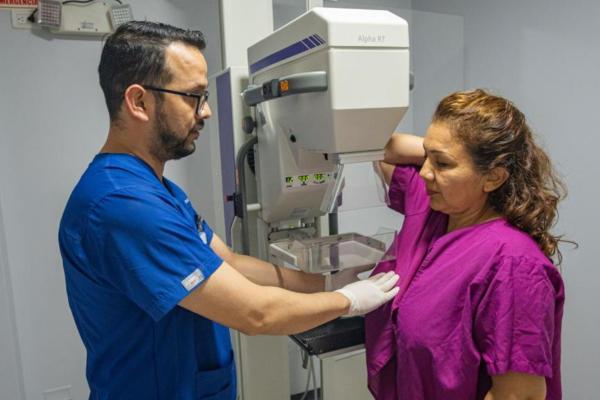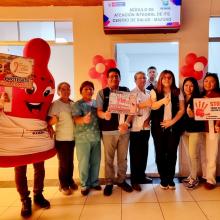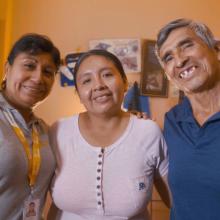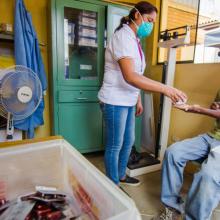In Peru, each year more than 6,000 women are diagnosed with breast cancer, a disease marked by the abnormal growth of cancerous cells in the breast tissue, which can spread to other areas of the body if not detected in time. This type of cancer occupies the first place of incidence in women in the world and the second most frequent neoplasm in our country.
According to the Pan American Health Organization (PAHO), breast cancer takes the lives of more than 100,000 women annually in Latin America and the Caribbean (3), making it one of the leading causes of mortality among women globally. It is therefore an alarming challenge evidenced by its high incidence and the significant emotional and economic impact it imposes on patients and their families.
In the framework of the World Breast Cancer Day, celebrated every October 19, we reaffirm the importance of early detection, with the aim of initiating timely treatment to achieve a cure, as well as to raise awareness of this disease among the population.
In that sense, according to the Global Cancer Observatory (Globocan) early detection has proven to be highly effective: 9 out of 10 women could overcome breast cancer if it is detected in its early stages. The Peruvian Ministry of Health (Minsa) underlines this figure by assuring that there is an 80 - 90% chance of cure when identified early.
How Socios En Salud strengthens the fight against breast cancer
Lack of access to medical services, lack of awareness and late detection are challenges that the Peruvian population faces. Since August 2020, at Socios En Salud we have collaborated with the Directorate of Integrated Health Networks (DIRIS) Lima Norte of the Ministry of Health in the implementation of the ALMA project of our Non-Communicable Diseases and Cancer program, for the early detection of breast cancer.
This community intervention seeks to increase the detection of breast lesions at the first level of care and contribute to the reduction of the incidence and mortality rate for breast cancer in women aged 50 to 69 years residing in Lima Norte, in accordance with the WHO Global Breast Cancer Initiative.
Obstetrician Melanie Condor, an ALMA project professional, emphasizes that this disease often has no symptoms in its early stages, so screening and checkups are essential for early detection. “This can make a big difference in health prognosis, with [breast cancer] being curable when identified early.” .
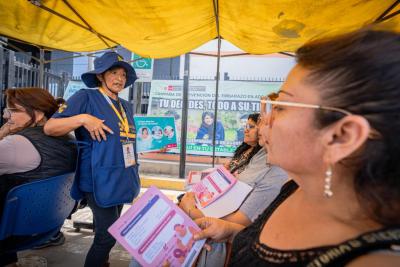
María Rosas, agente comunitaria de salud, brindando una charla informativa sobre la prevención y el diagnóstico temprano de cáncer de mama en el Centro de Salud Materno Infantil - Santa Luzmila II, ubicado en Comas.
Prevention, diagnosis and treatment of breast cancer
Thanks to our interventions, in 2022 we carried out screening of more than 900 women in northern Lima, providing access to breast lesion detection exams. Among them, we identified 298 women with breast lesions, of whom 12 were diagnosed with breast cancer. In 2023, our actions include:
- Approaching and recruiting participants in Comas and Carabayllo, through counseling on early detection of breast cancer conducted by our Community Health Agents (ACS).
- Accompaniment in the performance of clinical breast exams and delivery of results in local health centers in coordination with the CMI Santa Luzmila II and El Progreso health facilities.
- Follow-up and support to women with suspected breast cancer. ALMA facilitates referrals to higher complexity hospitals and provides socioeconomic support.
- Ongoing follow-up once the diagnosis is confirmed, through phone calls and home visits, ensuring that patients receive the required treatment.
- Emotional support through mutual support groups led by a psychologist, where diagnosed women share their experiences in their fight against this disease.
- Improved access to services among migrant women without Comprehensive Health Insurance (SIS) and present risk factors for breast cancer.
“In my family we have faced cases of cancer, but until now I had not been able to get screened. Thanks to your intervention, I have finally had the opportunity to access one, even with my busy schedule. Their constant communication and effort to ensure my attendance at the exam has made a real difference,” shares Mercedes Arco, one of ALMA’s beneficiaries.
The fight against breast cancer is a multi-pronged battle, and projects like ALMA play a crucial role in early detection and awareness. It is essential to continue working on prevention, diagnosis and support for women affected by this disease, in order to achieve a future where breast cancer is a much less devastating threat.
